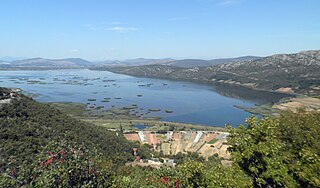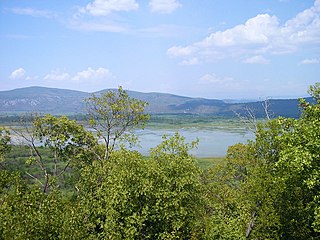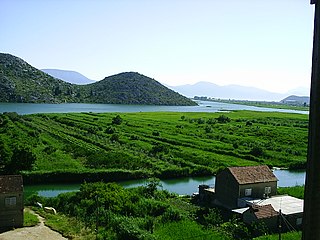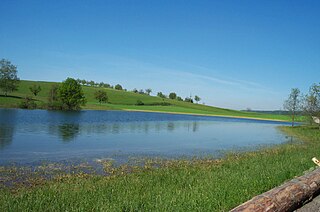
The Neretva, also known as Narenta, is one of the largest rivers of the eastern part of the Adriatic basin. Four hydroelectric power plants with large dams provide flood protection, electricity and water storage. The Neretva is recognized for its natural environment and diverse landscapes.

Livanjsko polje, located in Bosnia and Herzegovina, is the largest polje in the world and a RAMSAR wetland site. A typical example of karst polje encircled by tall peaks and mountain ranges, the field is characterized by many unique natural phenomenons and karstic features.

Hutovo Blato is a nature reserve and bird reserve located in Bosnia and Herzegovina. It is primarily composed of marshlands that were created by the underground aquifer system of the Krupa River. It is fed from the limestone massif of Ostrvo that divides the Deransko Lake and Svitavsko Lake. The reserve is on the list of BirdLife International's Important Bird Areas. It is the largest reserve of its kind in the region, in terms of both size and diversity. It is home to over 240 types of migratory birds and dozens that make their permanent home in the sub-Mediterranean wetlands surrounding Deransko Lake. In the migration season, tens of thousands of birds fill the lake and its surroundings.

The Buna is a short river in Bosnia and Herzegovina; it is a left-bank tributary of the Neretva. Its source, Vrelo Bune, is a strong karstic spring located near the village of Blagaj, southeast of Mostar. Vrelo Bune is one of the strongest springs in Europe and has extremely cold water. The Buna flows west for approximately 9 km, starts at Blagaj and, meandering through the villages of Blagaj, Kosor, Malo Polje and Hodbina, joins the Neretva near the settlement Buna. The site of confluence is called Buna Canals. The Bunica river is the main left-bank tributary of the Buna. The Buna is major habitat for an endemic trout species known under its vernacular name as Softmouth trout.
Prebilovci is a village in Bosnia and Herzegovina, near the city of Čapljina (Чапљина). Prebilovci was first mentioned in the 15th century. The village has a population of roughly around 50 inhabitants.

The Neretvan nase or Dalmatian nase, Serbo-Croatian: podustva, is a species of freshwater fish in the family Cyprinidae. It is found in Bosnia and Herzegovina and Croatia.

Salmo dentex is a variety of trout, a freshwater fish in the family Salmonidae, found in the western Balkans. Until recently the identity, biological distinctness and species status of the dentex trout were not properly clarified, but genetic data now suggest it is not a monophyletic unit that could be distinguished from other salmonids as a separate species.

The Čapljina Pumped-Storage Hydroelectric Power Plant is a pumped-storage hydroelectric power plant (PSHPP) or pumped hydroelectric energy storage power plant (PHESPP) type of hydroelectric power plant, whose powerhouse is situated underground near Svitava, in Bosnia and Herzegovina. It's one of country's largest hydroelectric power plants of any type, having an installed electric capacity of 420 MW.

Desilo is an underwater archaeological site in southern Bosnia and Herzegovina, located near the Neretva river and the Croatian border. The site was first discovered in the late 20th century, but Desilo's history can be traced as far back as ancient times. Investigations by a University of Mostar archaeological team in 2007 uncovered many sunken boats at the bottom of the small lake in Desilo valley. The archaeologists believe these boats to be Illyrian ships, dating back to the first and second centuries B.C. Further excavations in 2008 by University of Oslo archaeologists found evidence suggesting that Desilo was an Illyrian trading post. These archaeological findings are significant because they are the first known discovery of Illyrian ships. Additionally, Desilo functioning as a trading centre suggests there were peaceful interactions between the Illyrians and the Romans.

The Krupa river is a left tributary of the river Neretva and the main water current of Hutovo Blato, which leads the waters from Gornje Blato and Svitavsko Lake into the Neretva river near Dračevo. The length of Krupa is 9 km with an average depth of 5 meters. The Krupa is an extension and outlet of Deransko Lake. Also, the Krupa is a unique river in Europe, because the river flows both ways. It flows normally from the source to the mouth and from the mouth to the source. This happens when, due to high water levels and large quantities of water, the Neretva pushes the Krupa river in the opposite direction. The river has rich biodiversity, with numerous fish species endemic to the Neretva basin inhabiting Krupa and its lakes. It is observed that important Salmo marmoratus, known under its vernacular name as glavatica and/or gonjavac, and endemic to the handful of rivers of the Adriatic watershed, enters these waters to spawn.
The Bunica is a short river in Bosnia and Herzegovina and a left-bank tributary of the Neretva. It is also a main tributary of the Buna. Its source, Vrelo Bunice, is located under sharp cliffs between the villages of Hodbina and Malo Polje, 14 km south from Mostar. It is a very deep and strong karstic spring and difficult to access. Together with the Buna river, it flows west for approximately 10 km and joins the Neretva river near the village of Buna. The Bunica is inhabited by endemic trout species known under its vernacular name as Softmouth trout.
Buna is a populated settlement at the confluence of the Buna river and Neretva river some 10 km downstream the Neretva and south of Mostar, Herzegovina-Neretva Canton, Bosnia and Herzegovina.

Deransko Blato, also Deransko Lake, is a lake of Bosnia and Herzegovina. It is located in the Hutovo Blato, a nature reserve and bird reserve near Čapljina.
Jelim Lake is a lake of Bosnia and Herzegovina. It is located next to the much larger Deransko Lake, within the Hutovo Blato nature reserve. All of the lakes within the nature reserve are connected via canals and gorges.

Neretva Delta is the river delta of the Neretva, a river that flows through Bosnia and Herzegovina and Croatia and empties in the Adriatic Sea. The delta is a unique landscape in southern Croatia, and a wetland that is listed under the Ramsar Convention as internationally important, as the wetland extends into the Hutovo Blato in Herzegovina.
The fish fauna of the Neretva river basin in the western Balkans is representative of the Dinaric karst region and characterized by several endemic and endangered species.

Karst lakes are formed as the result of a collapse of caves, especially in water-soluble rocks such as limestone, gypsum and dolomite. This process is known as karstification. They can cover areas of several hundred square kilometres. Their shallow lakebed is usually an insoluble layer of sediment so that water is impounded, leading to the formation of lakes. Many karst lakes only exist periodically, but return regularly after heavy rainfall.

Lake Vrutak is artificial reservoir on the Trebišnjica river in Popovo Polje, near Hutovo village, Bosnia and Herzegovina. The lake serves as compensation and storage basin for Pump-Storage Hydroelectric Power Plant "Čapljina".















